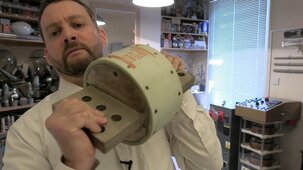Hey everybody. I have checked out other 12v vs 24v forum posts and can’t find the specific "why" behind some of the points being made. To be clear, I'm not calling out anyone for being wrong (I don't have the knowledge to do that!), I just feel like I need a bit more information to make the right decision for my specific project.
So the big question: 12v or 24v? What I can’t find specifically in other posts on the forum is why is a 3000 watt inverter is a bad idea to run off a 12 volt battery? This has been stated in a bunch of the forum posts I've searched. I have to ask the question; why does Victron make the 12/3000 Multiplus II if that’s not a good idea? I also keep hearing statements about wire size and efficiency.
When it comes to wire size, the Victron manual says for the 12/3000 I would need two 1/0 wires from the battery to the inverter. That wire run will only be 2 feet or so. That doesn’t seem like a big deal to me…what am I missing? As far as DC accessories in the rig, almost all are 12v, so not much savings on wire there if I did a 24v system. So the only real spot I would need heavier wire with a 12v system is between the battery and the inverter itself. With a 12v system, I also wouldn’t need the additional converter to take the 24v back down to 12v for most of the circuits. Please tell me what I’m missing! I could see if my lights, water pump, stereo, Maxx Air Fan, winch, usb charging receptacles, and whatever else were all 24v appliances, there would be significant savings on wiring, but they are all 12v.
Moving on to efficiency. Is it true that converting 12v to 3000w AC is inefficient in comparison to converting 24v to 3000w AC? if so, what's the efficiency difference? I wonder what that value is because if I end up going with 24v system, then I will have a loss through the 24v to 12v converter for all my DC circuits. Could that end up being close to a zero-sum game?
Thank you so much to anyone who can offer some insight on these things to help me and others who are wondering the same things. I truly appreciate it!
So the big question: 12v or 24v? What I can’t find specifically in other posts on the forum is why is a 3000 watt inverter is a bad idea to run off a 12 volt battery? This has been stated in a bunch of the forum posts I've searched. I have to ask the question; why does Victron make the 12/3000 Multiplus II if that’s not a good idea? I also keep hearing statements about wire size and efficiency.
When it comes to wire size, the Victron manual says for the 12/3000 I would need two 1/0 wires from the battery to the inverter. That wire run will only be 2 feet or so. That doesn’t seem like a big deal to me…what am I missing? As far as DC accessories in the rig, almost all are 12v, so not much savings on wire there if I did a 24v system. So the only real spot I would need heavier wire with a 12v system is between the battery and the inverter itself. With a 12v system, I also wouldn’t need the additional converter to take the 24v back down to 12v for most of the circuits. Please tell me what I’m missing! I could see if my lights, water pump, stereo, Maxx Air Fan, winch, usb charging receptacles, and whatever else were all 24v appliances, there would be significant savings on wiring, but they are all 12v.
Moving on to efficiency. Is it true that converting 12v to 3000w AC is inefficient in comparison to converting 24v to 3000w AC? if so, what's the efficiency difference? I wonder what that value is because if I end up going with 24v system, then I will have a loss through the 24v to 12v converter for all my DC circuits. Could that end up being close to a zero-sum game?
Thank you so much to anyone who can offer some insight on these things to help me and others who are wondering the same things. I truly appreciate it!



